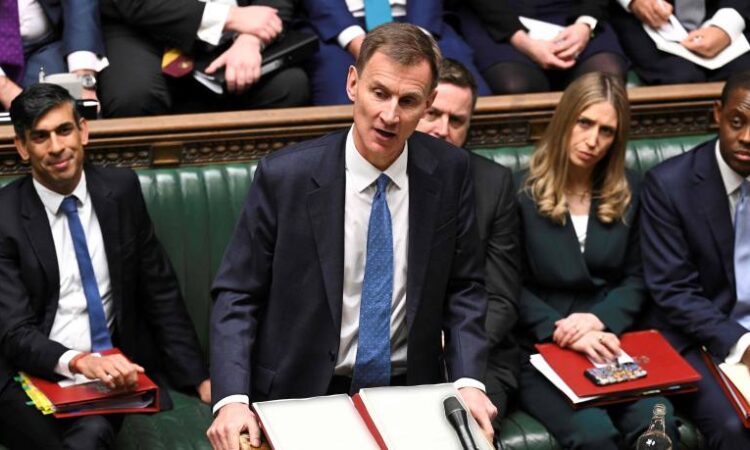
- The UK government’s Autumn Statement confirms its commitment to promoting open banking and payments reform
- The statement also approves of the measures laid out in former Nationwide Building Society CEO Joe Garner’s independent Future Payments Review
- Many of these commitments are tied to repealing formally adhered to EU rules and laws
This week, the UK government released its 2023 Autumn Statement, presented by the chancellor of the exchequer, as well as the results of the Future Payments Review.
Many in the payments, open banking and fintech space expected the statement to emphasise a further commitment to innovation in these sectors.
While the statement didn’t offer the fintech industry anything new, the chancellor did reiterate a commitment to initiatives already in motion. Many of these commitments are rooted in repealing rules previously connected to the UK’s membership of the EU.
One example includes “repealing prescriptive EU-derived payments authentication rules”, which the UK government says will allow “industry to better prevent fraud and improve the customer payments experience”. As part of this, the Financial Conduct Authority will consider the limits on contactless payments.
The UK government pointed to the repeal of over 100 pieces of “unnecessary retained EU law” earlier this year, and the passage of the Financial Services and Markets Act 2023 in July, as evidence that the government will continue to “take steps to ensure the UK maintains and enhances its world-leading financial services regulatory environment”.
In addition, the statement also said the UK government intended to seek legislation to better support open banking-enabled payments.
The Autumn Statement reads: “The government’s intention is for the new regulatory framework to require firms beyond the largest banks to participate in a sustainable and equitable commercial model through which the technology and necessary consumer protections will be developed, and with appropriate regulatory backstops.”
Chair of Open Banking, Marion King, says she is “delighted” to see the Autumn Statement and the findings in the Future Payments Review.
“Open Banking is committed to supporting all of those initiatives, and to ensure that we expand open banking more broadly more quickly, so that more consumers and small and medium-sized enterprises can benefit,” she says. “We always want timelines, we all want specificity, but one of the things that the Future Payments Review said was this is a complex market, a complex landscape, and please can we simplify it?”
According to Ben Ruffels, vice-president, public policy, at payments platform Volt: “Open banking in the UK is at a critical juncture. Our future framework must protect the foundations of the world-leading ecosystem we’ve built, while unleashing collaboration between banks and fintech companies that will catapult it forward.”
Part of the Edinburgh Reforms, the government expects progress in building a “smarter regulatory framework” for financial services tailored to the UK by the end of the year. It also reiterated its support of former Nationwide Building Society CEO Joe Garner’s independent Future Payments Review.
In line with the review’s central recommendation, the government will publish a National Payments Vision next year. Building from the review’s findings, this will include consideration of priorities for UK payments and, working with the Payment Systems Regulator and the Bank of England, will consider the role of the New Payments Architecture.
According to Pat Phelan, managing director of UK and Ireland and chief customer officer at GoCardless, the review update pointed to an overall dissatisfaction with cards and fees from businesses, plus the potential of open banking to become a payment alternative.
“The Future of Payments Review echoes what we’ve been saying for years: high card fees are hurting our economy and businesses need an alternative way to accept payments. It’s encouraging to see Joe Garner identify open banking as the primary solution for resolving this pain point for merchants,” said Mr Phelan.
Through the work of the Joint Regulatory Oversight Committee, the UK has already been exploring the issues highlighted by the review, which are fundamental to driving mass adoption: a great open banking user experience, consumer protection and the right incentives for everyone in the ecosystem. “We’ve spent hundreds of hours discussing these issues with banks and the regulators — landing on the right solutions will be critical to the success of open banking in the UK,” he says.
The purpose of the review was to answer three specific questions about UK retail payments:
- What are the most important consumer retail payment journeys both today and in the next five years?
- For these journeys today, how does the UK consumer experience for individuals and businesses compare vs other leading countries?
- Looking at the in-flight plans and initiatives across the payments landscape, how likely are they to deliver world-leading payment journeys for UK consumers?
Meanwhile, the Autumn Statement also announced that the UK government is committed to exiting its shareholding in NatWest, subject to market conditions and sales representing value for money. The government intends to fully exit by 2025–26, utilising a range of disposal methods, including accelerated bookbuilds and directed buybacks with NatWest and also via continuing sales through the ongoing trading plan.
As part of the plan to return NatWest to the private sector, the government will explore options to launch a share sale to retail investors in the next 12 months, subject to supportive market conditions and achieving value for money.





